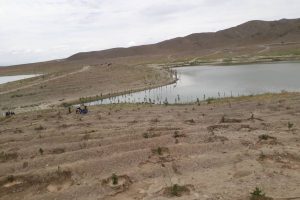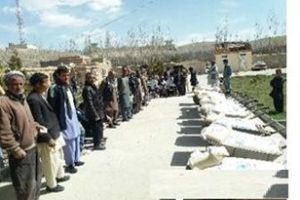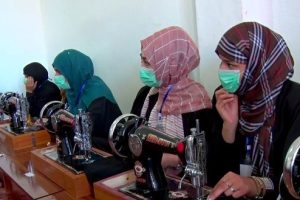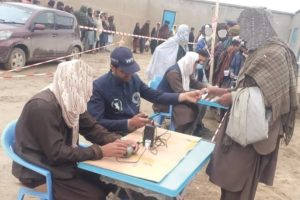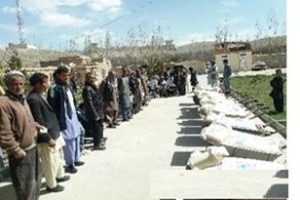HAALO’s Research & Monitoring Program is designed to ensure the effectiveness, transparency, and sustainability of its projects across central, southern and southeast region provinces. By conducting comprehensive research and implementing rigorous monitoring and evaluation (M&E) systems, the program aims to provide data-driven insights to improve the design, implementation, and outcomes of HAALO’s interventions. The program supports evidence-based decision-making, promotes accountability to donors and beneficiaries, and helps to continuously refine strategies to address the evolving needs of communities.
Program Components:
- Baseline Studies and Needs Assessments:
- Community Needs Assessments: HAALO conducts thorough needs assessments at the beginning of every project to understand the specific challenges, needs, and priorities of target communities. These assessments gather data on socioeconomic conditions, food security, livelihoods, health, education, and infrastructure, providing a foundation for designing responsive programs.
- Baseline Surveys: Prior to the implementation of any major project, HAALO conducts baseline surveys to establish key indicators related to project goals. These surveys help measure the starting point of communities in terms of food security, health, income, and other factors that are critical for project evaluation.
- Monitoring and Evaluation (M&E) Systems:
- Project Monitoring: HAALO employs a systematic approach to monitor the progress of its projects. This includes regular site visits, data collection, and stakeholder consultations to ensure that activities are on track and aligned with project objectives. Monitoring reports are generated on a monthly or quarterly basis to provide real-time insights into project performance.
- Data Collection Tools: The program uses both qualitative and quantitative data collection tools such as surveys, focus group discussions, and key informant interviews to gather comprehensive data. Digital tools and mobile data collection are increasingly utilized to enhance efficiency and accuracy.
- Outcome Monitoring: In addition to activity monitoring, HAALO measures the impact of its interventions by tracking key outcome indicators such as improvements in food security, income levels, health status, education participation, and gender equality. This helps determine whether the desired changes are being achieved and informs any necessary course corrections.
- Impact Evaluations:
- Midterm and Endline Evaluations: HAALO conducts midterm and endline evaluations for its larger projects to assess their overall impact. These evaluations compare baseline data with midterm or endline data to measure progress and determine the long-term effects of the interventions.
- Impact Assessments: The program carries out in-depth impact assessments to evaluate the broader socio-economic effects of HAALO’s projects on communities. This includes analyzing changes in livelihoods, food security, health outcomes, women’s empowerment, and environmental sustainability.
- Cost-Effectiveness Analysis: HAALO evaluates the cost-effectiveness of its interventions to ensure that resources are being used efficiently and that maximum impact is being achieved with the available funding.
- Research for Program Design and Policy Development:
- Operational Research: HAALO conducts operational research to inform program design and improve implementation strategies. This research explores best practices, innovative approaches, and lessons learned from ongoing projects, enabling HAALO to adapt and refine its methods.
- Sectoral Research Studies: HAALO undertakes research in specific sectors such as agriculture, food security, health, and climate change to provide evidence for policy advocacy and program development. These studies generate valuable insights on sectoral challenges, opportunities, and the potential for scaling up successful interventions.
- Collaboration with Academic Institutions and Research Organizations: HAALO partners with universities, research institutions, and think tanks to conduct high-quality research and ensure that its findings are robust, scientifically sound, and aligned with international development standards.
- Capacity Building in Research and M&E:
- Training for Staff and Partners: HAALO invests in building the capacity of its staff and local partners to conduct research and implement M&E activities effectively. This includes training in data collection methodologies, digital tools, data analysis, and reporting. By strengthening the capacity of local teams, HAALO ensures that research and monitoring are integrated into all aspects of project management.
- Community-Based Monitoring: The program empowers local communities to participate in monitoring activities by training community members to collect data, report on project progress, and provide feedback. This participatory approach enhances transparency, accountability, and community ownership of projects.
- Real-Time Data Analysis and Reporting:
- Data Management Systems: HAALO employs modern data management systems that enable real-time tracking of project indicators. Digital tools such as mobile apps and online dashboards are used to collect, analyze, and visualize data, allowing project managers and donors to access up-to-date information on project performance.
- Reporting and Feedback Mechanisms: The program ensures timely and transparent reporting to donors, partners, and beneficiaries. Regular progress reports, impact assessments, and case studies are shared with stakeholders to demonstrate the effectiveness of HAALO’s interventions. Feedback mechanisms are also established to allow community members and beneficiaries to provide input on the quality and impact of the projects.
- Learning and Adaptation:
- Adaptive Management: HAALO uses the data collected through research and M&E activities to adapt its projects in response to changing conditions and feedback from beneficiaries. This adaptive management approach ensures that projects remain relevant and responsive to the needs of the communities they serve.
- Knowledge Sharing and Learning: HAALO actively disseminates the findings from its research and evaluations through workshops, conferences, publications, and online platforms. These knowledge-sharing efforts help to inform the wider development community and contribute to best practices in the field of humanitarian and development work.
- Accountability and Transparency:
- Donor Accountability: Through comprehensive research, monitoring, and reporting, HAALO ensures that it meets the expectations and requirements of its donors. Clear, evidence-based reports are submitted to funding partners such as the World Bank (WB) and the World Food Programme (WFP) to demonstrate the impact of funded projects.
- Community Accountability: HAALO is committed to being accountable to the communities it serves. The program ensures that community members have access to information about project goals, progress, and outcomes, fostering trust and transparency in HAALO’s work.
Long-Term Goals and Impact:
HAALO’s Research & Monitoring Program aims to create a culture of learning and continuous improvement within the organization. By embedding research and M&E into every stage of project implementation, HAALO ensures that its interventions are effective, efficient, and aligned with the needs of the communities it serves. The program strengthens the evidence base for HAALO’s work, supports adaptive management, and contributes to the development of innovative, data-driven solutions for long-term development in Ghazni province


